Your guide to ASX Financials (minus the Big Four banks)
For many of us, Australia’s big banks are the first assets that spring to mind in any discussion of the ASX Financials sector. And that’s unsurprising, given the four major banks’ combined market capitalisation of $410 billion (as of Friday 21 April) comprises such a large proportion of the total ASX.
But you can also invest in different parts of the sector such as wealth platforms.
You may also choose to “invest in the investors” by buying the stock of one or more professional asset managers that are listed on the ASX. Buying the stock of the listed operating companies (the “head stock”) of asset managers also means you don’t pay the management fees. In addition, you stand to benefit from the fees paid by other investors.
Fund managers generate earnings by charging these fees based on a percentage of their funds under management. Many also charge a performance fee on any proportion of their return that beats the performance of an index, against which they commonly benchmark their return.
But there’s a long-running debate about the pros and cons of buying a fund manager’s head stock versus putting your money into the underlying investment strategies. The share price of listed asset managers tends to be highly leveraged to the performance of their underlying funds. If markets are delivering strong returns and the fund is outperforming, the listed stock will generally deliver higher returns. But the reverse is also true.
“From an investor point of view, they’ve got double leverage, to some extent,” says Henry Jennings, senior market analyst at Marcus Today.
“Even if they’re bearish, asset managers’ cash levels are rarely above 10%. So, as the equity market increases in valuation, their FUM should also increase – and that’s even if they don’t attract any new money.”
Though this last point is something fund managers actively focus on, as we’ve seen more recently, especially from retail-focused asset managers. Magellan Financial Group is a prime example, with its launches of ASX-listed funds and (ultimately doomed) sponsorship of Cricket Australia.

“There have been some slipups along the way, MFG being the most obvious,” Jennings says.
“And valuations are always interesting in terms of how much you can squeeze the lemon. It’s a question of how much they’ve got under management, how much they get from their fees, and the level of the performance fee.”
As we saw in the case of Magellan, key man risk can be an issue for asset managers. But overall, Jennings describes funds management as “a really simple business.”
“All you have to do is outperform the index by a really small amount, and be a good marketer,” he says.
Jennings also emphasises the complications that larger scale can create for these companies. That’s because of their asset-based fees, which means it’s much easier to grow FUM by 20% if you’re running a $1 billion business versus a $20 billion company: “You don’t want to get too big, too quickly.”
In the following article, I delve into a recent Bell Potter report on Regal Partners, which the stockbroker rates as its preferred play in the space. I also look at the views held by this and other brokers on some competing asset managers also listed on the ASX.
Regal Partners (ASX: RPL)
Rating: BUY
Price target: $3.71
In a report handed down this week, Bell Potter equity analyst Marcus Barnard outlined why Regal Funds is his preferred company in the space. The stockbroker kicked off its coverage of the stock on 17 April with a BUY rating.
A relatively small but rapidly growing asset manager, Regal Funds offers a range of Alternative strategies and held $5.5 billion of FUM as of 31 March 2023.
“It has a highly entrepreneurial culture, as illustrated by the expansion through M&A, the launch of new strategies, and the ambitious approach to Perpetual in late 2022,” writes Bell Potter’s Barnard.
He also notes Regal’s FUM is growing, “which is unusual in the asset management industry, outside of private market and ESG-type strategies.”
Regal has launched seven new funds in the last three years, its private credit strategy which opened in January the newest of these. It also floated a listed investment trust, Regal Investment Fund (ASX: RF1 ) in 2019, following a merger with VGI Partners.
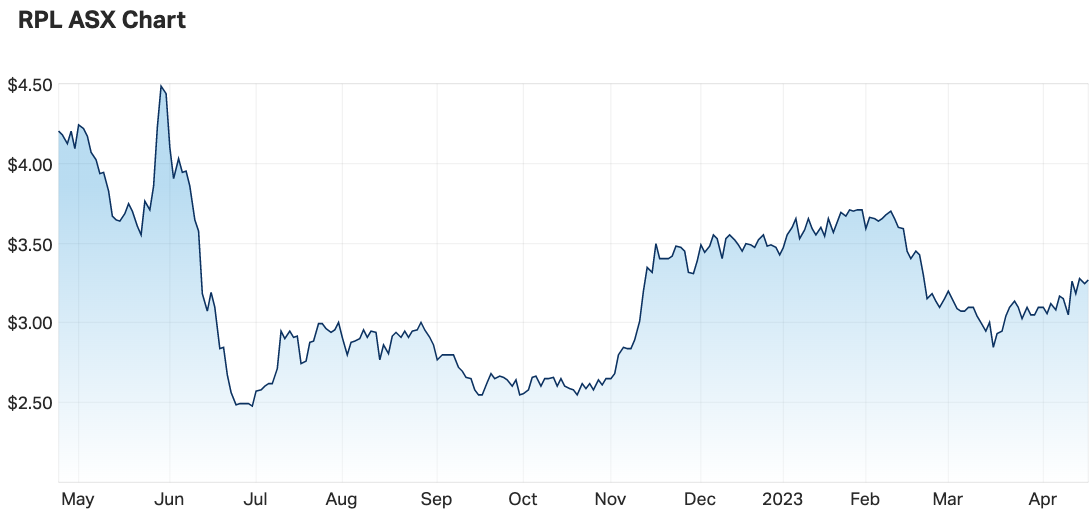
Underpinning Bell Potter’s thesis on Regal Funds is its:
- Exposure to Alternative high-growth investments that aren’t widely available to investors
- Entrepreneurial culture and fast growth
- Profitability, with strong fund returns
- Momentum of inflows and capital raising
- High alignment of staff.
But there are some caveats in Barnard’s assessment including the limited market, with many of RPL’s underlying funds only able to be marketed to sophisticated investors or wholesale clients. Barnard also calls out some complexity and a shortage of information.
“This is not a straightforward investment manager and the merger of Regal Funds Management and VGI Partners has made the group more complex,” he says.
Barnard notes it can be difficult to get consistent information on the size, unit, price and performance of all the funds.
“We found limited data on the underlying funds from mainstream data providers Bloomberg, Morningstar and Iress,” he says.
Regal’s share price closed at $3.27 on Thursday – a 12% discount to Bell Potter’s target price.
Another broker’s view
Regal Partners is also the preferred ASX-listed wealth company of Shaw and Partners. Equity analyst Jonathon Higgins initiated coverage on RPL at the end of October, also kicking off with a BUY rating. And the stock’s closing price as of Thursday sees the company trading almost 80% below the $5.88 Higgins thinks it’s worth.
Market Matters was slightly disappointed with the $200 million of net inflows reported in Regal’s quarterly update on Monday – though this figure was in line with expectations. That’s because $200 million was earmarked for its new Private Credit fund earlier in the year.
But like Bell Potter, the Shaw and Partners-affiliated wealth business emphasises Regal is one of only a handful of fund managers increasing the levels of cash invested in its products.
“We continue to see Regal as the premier listed alternative asset manager with the ability to grow FUM both organically and inorganically with its balance sheet,” noted Market Matters in an update on Wednesday.
This also mentions Regal’s new agriculture fund that’s launching next month and the strong cash level of around $210 million on its balance sheet, which it’s putting to work in various ways including the latest acquisition of Asian long/short fund manager East Point.
How other ASX-listed fund managers stack up
Some other prominent ASX-listed asset managers were also mentioned in the Bell Potter report, with their relative performance noted in the following table.
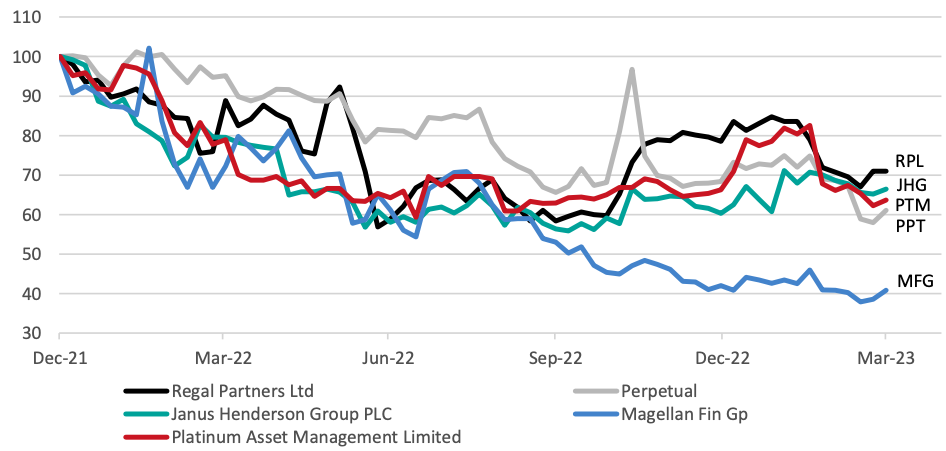
Janus Henderson Group (ASX: JHG)
A diversified asset manager, Janus Henderson was formed by the 2017 merger of long-established global fund managers Janus Capital and Henderson Group, which were based in the US and UK, respectively.
The merged entity – which has operations in Europe, Latin America, Japan, Asia and Australia – provides investments in equities, fixed income, quantitative equities, multi-asset, and alternative asset class strategies. JHG is due to announce its first-quarter 2023 earnings on 3 May, US Eastern Standard Time.
Citi analyst Nigel Pittaway on 10 April upgraded the company to NEUTRAL from Sell, increasing his price target to $37.80 from $34.50. With a Thursday 20 April closing price of $39.16, this sees the company trading at a 3.4% premium.
Earlier this year, on 6 February, Bell Potter’s Barnard downgraded JHG to HOLD from Buy, leaving his price target unchanged at $43.81. In his eyes, this means the stock is currently trading at a discount of almost 12%.
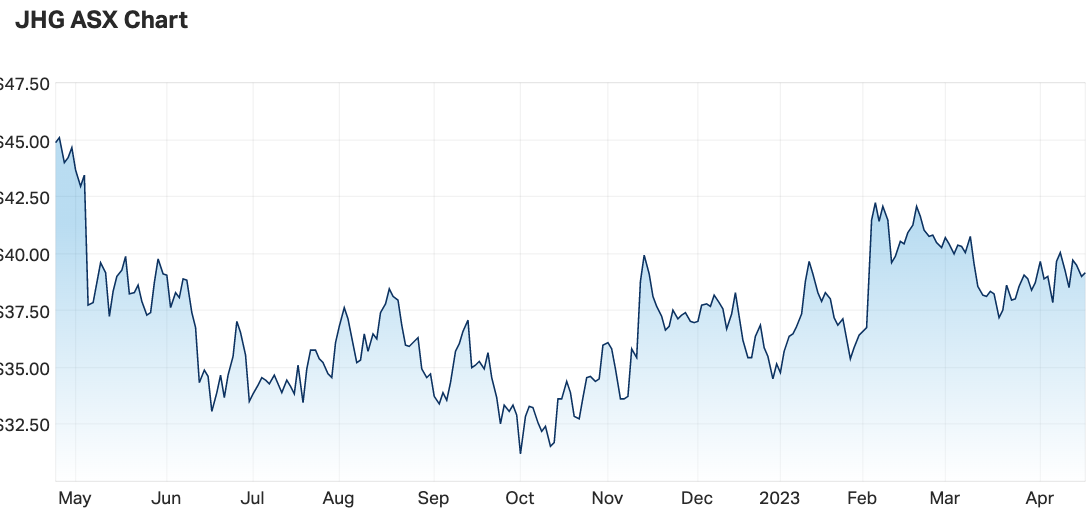
Platinum Asset Management (ASX: PTM)
A global equities manager, Platinum Asset Management was founded in 1994 by local financial industry icon Kerr Neilson, who retains a more than 20% stake in the business. His protégé Andrew Clifford, who took over as CEO in 2018, owns 5.6% and Regal Funds is the third-largest shareholder with a 5.5% stake.
On 13 March, Bell Potter’s Barnard upgraded the company to HOLD from Sell, but cut his price target to $1.66 from $1.68. At Thursday’s closing price of $1.73, this sees the stock trade at a discount of just over 4%.
CLSA analyst Ed Henning downgraded Platinum to SELL from Underperform on 23 February but increased his price target to $2 from $1.71. Based on this view, the stock trades at a 15.6% discount.
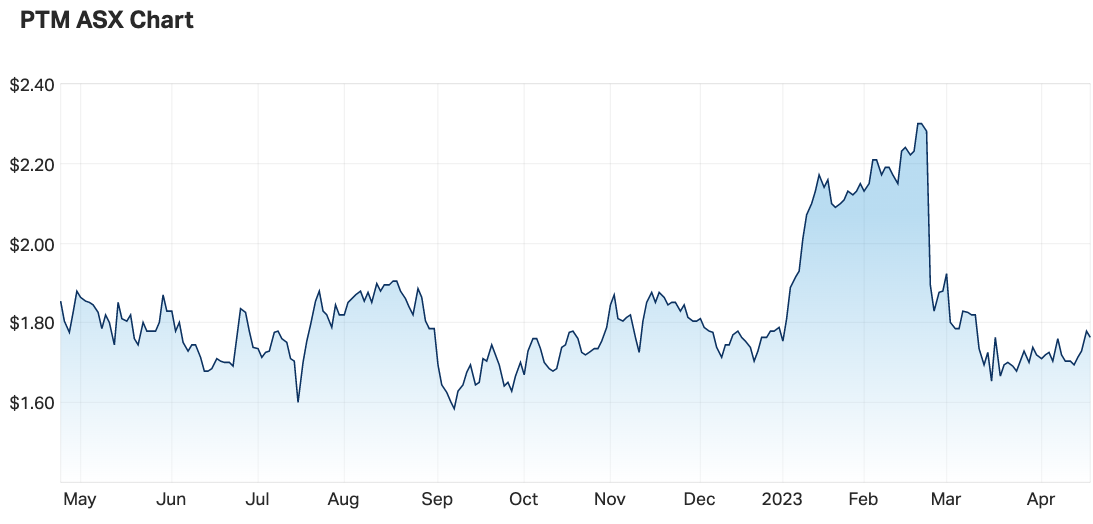
Perpetual Ltd (ASX: PPT)
With a track record stretching back to 1886, Perpetual’s investment mix includes strategies in Australian and global equities, credit, multi-asset and ESG for Australian and New Zealand clients. In January, the company completed a high-profile, $2.5 billion acquisition of rival firm Pendal Group.
On 22 March, Jarden equity analyst Kieren Chidgey upgraded his rating for Perpetual to OVERWEIGHT from Neutral and increased his price target to $27 from $26.60. Based the company’s Thursday close of $24.40, this sees the stock trading at a 10.6% discount.
Macquarie broking resumed its coverage of the company on 28 February with an OUTPERFORM rating and a $30 price target – suggesting a discount of almost 23% based on the latest closing price.
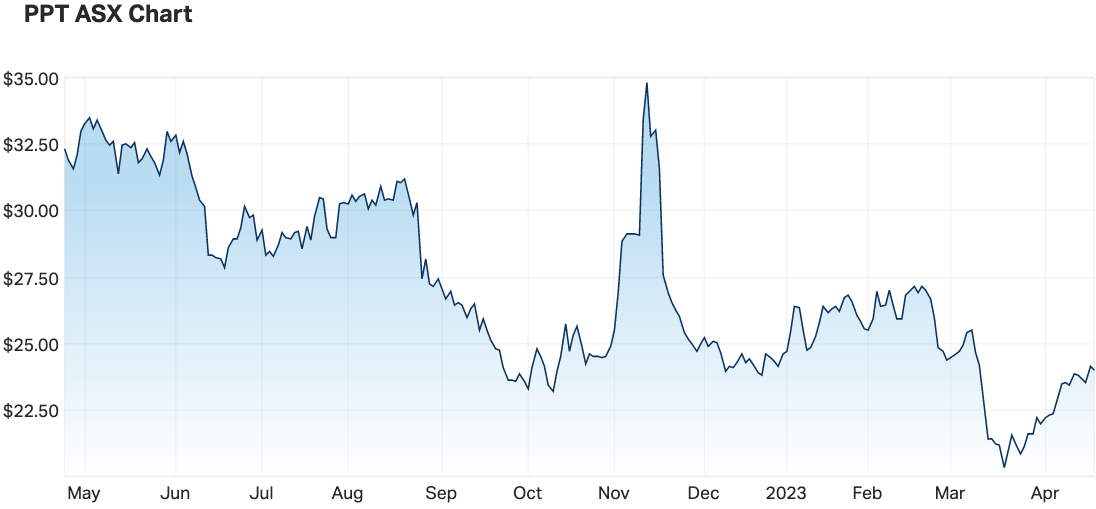
Magellan Financial Group (ASX: MFG)
A global equities fund manager, Magellan was co-founded in 2004 by its talismanic former CIO Hamish Douglass, who departed last March under a cloud of controversy. Though he’s since returned as a consultant, Magellan has seen its FUM spiral downward, with $800 million in net outflows in the first quarter of 2023, according to Market Matters.
Wilson Asset Management’s Geoff Wilson also said earlier this month the firm could be an acquisition target if its shares continue declining, as reported by the Australian Financial Review.
On 15 February, UBS analyst Shreyas Patel upgraded Magellan to BUY from sell and increased his price target to $10 from $8.60. At the company’s Thursday closing price of $8.04, he views the stock as more than 24% undervalued.
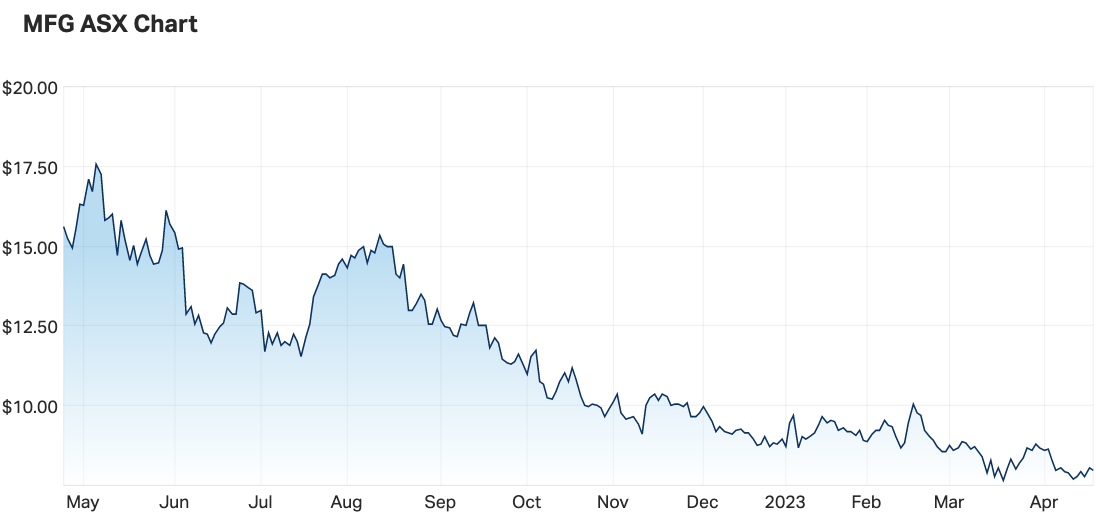
Henry's perspective
Though Marcus Today’s Jennings concedes he held Regal Funds in his portfolio for a long time, it’s not currently a stock he owns.
“Platinum is my preferred play, with a disgruntled large shareholder on the sidelines who would like an exit strategy,” Jennings says.
He refers here to the public criticisms co-founder Kerr Neilson has levelled at CEO and CIO Andrew Clifford.
Jennings believes Phil King – the high-profile, acquisitive co-founder of Regal Funds – will try to leverage his way into Platinum.
And though speculation has surged about a potential takeover of Magellan, Jennings leaves it in the “too-hard basket” for now.
1 topic
6 stocks mentioned
1 contributor mentioned

